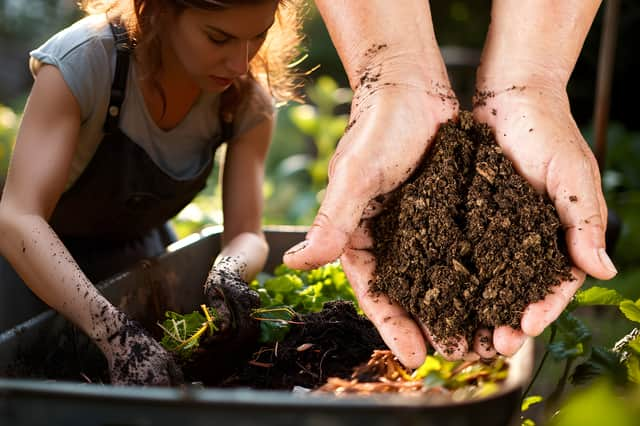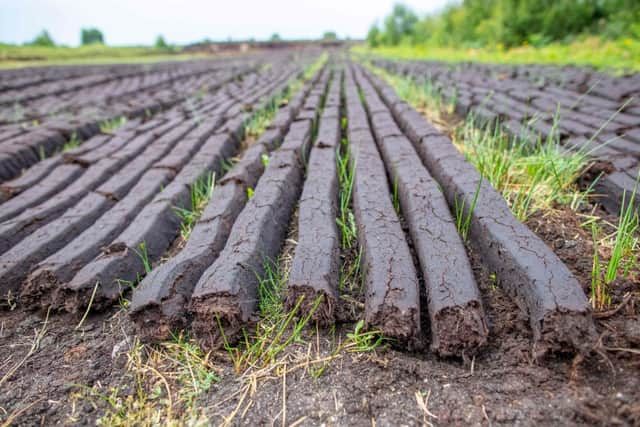Peat: 'Destructive' gardening staple could soon be banned - what are the cases for and against?
and live on Freeview channel 276
A controversial but highly effective gardening staple could soon be banned for the environmental destruction it causes - even as opponents argue there is currently no suitable alternative.
On Tuesday (16 April), former environment secretary Theresa Villiers presented her proposed Horticultural Peat (Prohibition of Sale) bill in the House of Commons. The bill aims to ban the sale of peat for use in amateur gardening by the end of the year - with some exceptions - a move she said would fulfil a promise made by the government in 2022. Its second reading will be heard next week, on 26 April.
Advertisement
Hide AdAdvertisement
Hide AdAccording to the International Peatland Society, peat is a layer of surface soil made up of rich, decomposing plant matter. It only develops in specific conditions usually tied to wetland habitats, and it can’t be easily replaced once it is removed. It can take 10 years for just a centimetre of peat to develop, and centuries for entire bogs to form.
Extracting peat has long been a contentious issue, and it has fallen out of favour with many more ecologically-minded gardeners. But Villiers told the Commons that it can still lurk in products like potted house plants and trays of bedding plants. “The presence of peat in these products is rarely labelled, meaning even the most ecologically committed gardener may not know it is there,” she said. “Gardeners should be able to buy from a garden centre without fear that their purchase will harm the environment elsewhere.”
With the bill’s second reading just days away now, what are the cases for and against banning the sale of peat for gardening? Here’s everything you need to know:


The case for banning peat sales
Opposition to extracting peat from the UK’s peatlands first took off in the 1990s, and legislation to ban its sale for gardening has been pondered by the government for over a decade, according to the Wildlife Trusts. Two years ago the government committed to banning peat sales for private gardens and allotments by the end of this Parliamentary term - set to be this year. However, the sale of peat compost and other products is still legal in the UK for the time being.
Advertisement
Hide AdAdvertisement
Hide AdThe use of peat is controversial, because it needs to be extracted from Britain’s peatland ecosystems - also known as ‘peat bogs’. This often destroys them, removing both habitat for wildlife and some of the UK’s most important carbon sinks in one fell swoop. It is estimated that 87% of England’s peatlands are degraded in some way - either damaged or dried out.
The UK’s peatlands are home to many unique plant and animal species specially adapted to their wet and acidic conditions. These include plants like sphagnum moss and the star-like bog asphodel flower; insects like the rare and tiny Desmoulin's whorl snail and swallowtail butterfly; and birds, toads, lizards, and small mammals galore. With the latest State of Nature report finding one in six British species were now at risk of extinction, the Trusts say a ban on destroying peatlands for gardening would be “important progress towards reversing these catastrophic declines”.


The Wildlife Trusts’ public affairs officer, Ailis Watt, said peat bogs were also central to the UK’s ability to fight the climate crisis. “When in a healthy state, peatlands lock up and store carbon for millennia. However, decades of human interventions have transformed peatlands into carbon sources - emissions from degraded peatlands now account for 4% of the UK’s total annual greenhouse gas emissions.”
Banning peat sales for private use is also reasonably popular with the public. During the original public consultation in 2022, 95% of responders - of which 88% were amateur gardeners - were in favour of a complete retail sales ban, the charity added.
Advertisement
Hide AdAdvertisement
Hide AdThe case against banning peat
At the bill’s first reading earlier this week, Conservative MP Sir Christopher Chope “put in a plea on behalf of amateur and professional horticulturalists” by opposing it. He described Villiers’ bill as disproportionate, not based on science or fact, and “another exercise in gesture politics”.
“Those who have been to plant centres over the past year or so will have noticed that the move to peat-free products has resulted in the quality of those products declining significantly,” he claimed. “Plant longevity has declined, because they do not have the natural water retention in their pots that is provided by peat, and it cannot be replaced by peat substitutes. The consequence is that it is becoming increasingly difficult for our domestic horticultural industry to cope with the pressures to reduce peat consumption.”
Popular food crop plants like blueberries would also suffer if peat was banned for horticultural use, he added. “Peat is very acidic... and if you try growing blueberries in non-acidic soil, you will find that they die quickly.”
Chope conceded that that use of peat was “extremely dirty”, but honing in on the horticulture industry was unfair when peat was still widely available to burn as a coal alternative - which he said was a much larger problem. “If we can buy peat for fuel, why are we trying to concentrate on banning peat in horticulture, where there is no real substitute?”
Advertisement
Hide AdAdvertisement
Hide AdCurrent substitutes like coir - a type of coconut fibre - were produced as far as Sri Lanka, he continued. “That coir has to be washed and desalted before it can be prepared for horticultural use, and it then has to be transported halfway across the world. That is not an ecologically friendly way of producing a peat substitute.”
Comment Guidelines
National World encourages reader discussion on our stories. User feedback, insights and back-and-forth exchanges add a rich layer of context to reporting. Please review our Community Guidelines before commenting.
